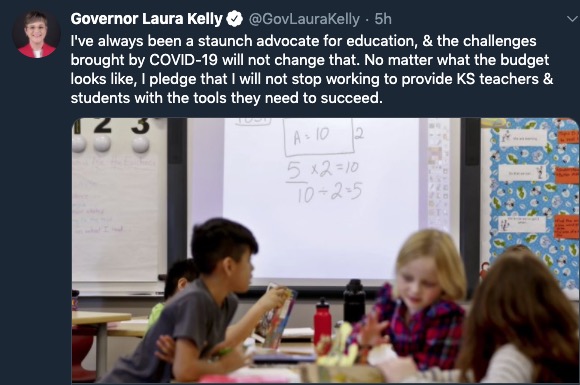The 2020 special session of the Kansas Legislature came to an end at about 3:45 p.m. today (June 4) when the House received word the Senate had passed HB 2016. House members passed the same bill last night.
The bill, which deals with emergency powers under the Kansas Emergency Management Act, or KEMA, was a compromise worked out between Governor Laura Kelly and legislative leaders after she vetoed the bill (HB 2054) that passed during the 24-hour sine die session.
HB 2054 severely limited the Governor’s authority to deal with COVID-19 and established a complex web of decision-making that would have made nimble reactions to the pandemic impossible. The bill that passed still provides for more legislative oversight of the Governor’s decisions and allows for county-by-county flexibility but is a vast improvement in many ways over the vetoed bill.
But as legislators explained their votes, there was something to love and something to hate for everyone in the bill. Some objected to the liability immunity for businesses while others think those provisions are not strong enough. Many are worried about provisions that do not apply to long term care facilities or the lack of more support for unemployment insurance, workers compensation, and protection from evictions and foreclosures.

When it comes to the education system, there is one new provision in the bill and we now have clarity on another provision that caused us concern.
The new provision deals with possible future school closings. If the Governor calls for the closure of schools, the Kansas State Board of Education is required to meet and ratify the closure recommendation through the adoption of a resolution.
As we reported in an earlier post, we expressed our concerns about new restrictions being put on the expenditure of CARES (federal stimulus) money. Some of the CARES money was sent to the Governor while CARES money earmarked for schools went to a special fund at the Kansas State Department of Education. School districts have been applying for – and, in some cases – have already received some of those CARES funds.
In our conversations with legislative leaders and the Governor’s office over the past two days, we have now been assured the special account dollars would NOT be subject to the additional step of appealing for approval from the State Finance Council. That means the federal COVID-19 stimulus funds earmarked for schools will continue to be disbursed as they have been.
Resurrected bills
Legislative committees also resurrected two of the other bills vetoed by the Governor. HB 2510, the sine die education bill, was brought forth again as SB 5 with a revision meant to address the Governor’s veto message which had to do with the cost of the bill. HB 2702 was the tax bill that prohibited cities and counties from assessing penalties and interest on late property tax payments until August. The Governor vetoed the bill because it would limit funding for local police and fire protection during a time when those services were in great demand. There were a number of other provisions as well. The bill came back as SB 4.
While both of these bills came out of committee on Wednesday, neither one was considered on the floor of the Senate and so died upon adjournment today.


